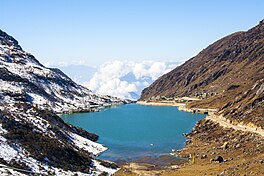| Lake Tsomgo Changu Lake | |
|---|---|
 Lake Tsomgo in Gangtok district (Sikkim) Lake Tsomgo in Gangtok district (Sikkim) | |
 Changu LakeLocation in Sikkim | |
| Location | Changu, Gangtok district, Sikkim |
| Coordinates | 27°22′31″N 88°45′50″E / 27.37528°N 88.76389°E / 27.37528; 88.76389 |
| Basin countries | |
| Max. length | 836 metres (2,743 ft) |
| Max. width | 427 metres (1,401 ft) |
| Surface area | 24.47 hectares (60.5 acres) |
| Average depth | 4.58 metres (15.0 ft) (average) |
| Max. depth | 15 metres (49 ft) |
| Surface elevation | 3,753 metres (12,313 ft) |
| Frozen | winter |
Tsomgo Lake, also known as Tsongmo Lake or Changgu Lake, is a glacial lake in Changu in the Gangtok district of the Indian state of Sikkim, some 40 kilometres (25 mi) from the capital Gangtok. Located at an elevation of 3,753 m (12,313 ft), the lake remains frozen during the winter season. The lake surface reflects different colours with change of seasons and is held in great reverence by the local Sikkimese people. Buddhist monks prognosticated after studying the changing colours of the lake.
Etymology
In Sikkimese language the name Tsomgo is made of two words 'Tso' meaning "lake" and 'Mgo' meaning "head" which gives the literal meaning as "source of the lake".
Topography
The lake is surrounded by steep mountains which are covered with snow during winter. During summer the snow cover melts and forms the source for the lake. The lake which remains frozen in winter season, sometimes extending up to May, receives an average annual precipitation of 1,183 millimetres (46.6 in) with temperatures recorded in the range of 0–25 °C (32–77 °F).
The lake is about 40 kilometres (25 mi) away from Gangtok on the Gangtok-Nathula highway. Further, the road to Nathu La skirts the lake on the north side. The Chinese border crossing is only some 5 kilometres (3.1 mi) east-northeast in a straight line, but some 18 kilometres (11 mi) by road.
Features

The lake is formed in an oval shape and has a surface area of 24.47 hectares (60.5 acres). The maximum length of the lake is 836 metres (2,743 ft) and has a maximum width of 427 metres (1,401 ft). The maximum depth reported is 15 metres (49 ft) while the average depth is 4.58 metres (15.0 ft). The lake water quality is of moderate turbidity.
The lake is the venue for the Guru Purnima festival which is also the Raksha Bandhan festival when the faith healers known as Jhakris of Sikkim assemble at the lake area to derive benefits from the healing qualities of the lake waters.
Alpine forests cover the catchment of the lake. After the winter season ends in middle of May, the periphery of lake has scenic blooms of flower species of rhododendrons (the state tree of Sikkim), primulas, blue and yellow poppies, irises and so forth. Also seen in the precincts of the lake are several species of birds including Brahminy ducks. Wildlife seen includes the red panda.
Tourist attractions at the lake site include joy rides on decorated yaks and mules where kiosks offer variety of food and drinks. There is also a small Shiva temple on the bank of the lake.
Entry permits
As the lake is located in a restricted area it is essential for all Indians visiting the area to obtain permits. In case of foreign nationals special permit is essential.
Indian Postal Service released a commemorative stamp on the lake on 6 November 2006.
Border trade market
The nearby habitation of Changgu was declared a border trade market in 2003.
1mile
Gallery
-
 Tsongmo Lake, January 2014
Tsongmo Lake, January 2014
-
 Tsomgo Lake
Tsomgo Lake
-
 Tsongmo Lake in Winter
Tsongmo Lake in Winter
-
 Tsomgo Lake in April 2017
Tsomgo Lake in April 2017
-
 Tsomgo Lake in October
Tsomgo Lake in October
-
 Tsomgo Lake in April 2019
Tsomgo Lake in April 2019
See also
Tourist Attraction
It is one of the biggest tourism draws in the Eastern Himalayan state of Sikkim receiving around 300,000 (3 lakh) tourists annually. The best time to visit the lake is January to March.
References
- ^ "Tsomgo (Changu) Lake". Sikkim Tourism:Government of Sikkim.
- ^ "Tsomgo Lake". National Informatics Centre.
- ^ Kar 2014, p. 101.
- deBruyn, Pippa; Bain, Keith; Venkatram, Niloufer; Joshi, Shonar (4 March 2008). Frommer's India (Frommer's Complete). Hoboken, New Jersey, USA: Frommer's. p. 586. ISBN 978-0-470-16908-7. Retrieved 29 November 2009.
- O'Neill, A. R. (2019). "Evaluating high-altitude Ramsar wetlands in the Sikkim Eastern Himalayas". Global Ecology and Conservation. 20 (e00715): 19. doi:10.1016/j.gecco.2019.e00715.
- "Changu Lake stamp and Sikkim Philately". Sikkimphilatelic Society.
- "Documents signed between India and China during Prime Minister Vajpayee's visit to China". Ministry of External Affairs, Government of India. 23 June 2003. Retrieved 27 March 2021.
- Acharya, Alka (2008). China & India: Politics of Incremental Engagement. Har-Anand Publications. p. 134. ISBN 978-81-241-1442-1.
- "Darjeeling and Sikkim Tourism places have the most beautiful sights for 2021 trip". Retrieved 12 June 2021.
Tsomgo Lake travel guide - Permit Regulations Climate Temperature
Bibliography
- Kar, Devashish (28 January 2014). Wetlands and Lakes of the World. Springer Science & Business Media. ISBN 978-81-322-1023-8.
| Hydrography of Sikkim | |
|---|---|
| Rivers | |
| Lakes | |
| Glaciers | |